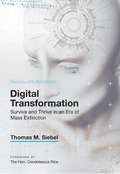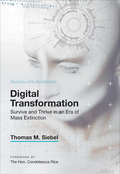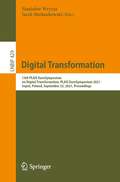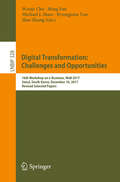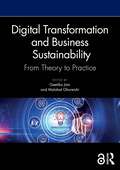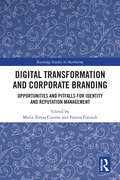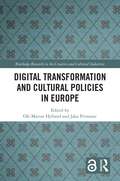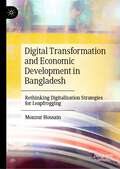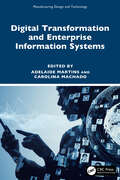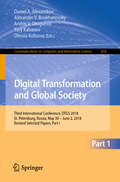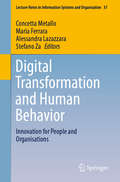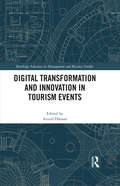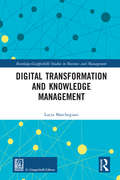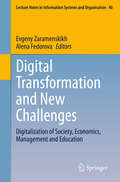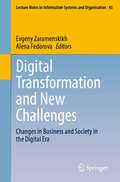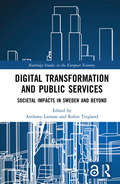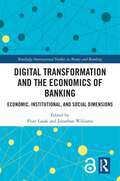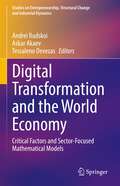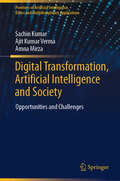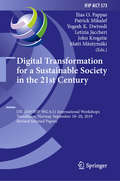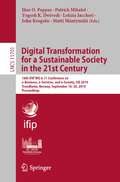- Table View
- List View
Digital Transformation: Survive and Thrive in an Era of Mass Extinction
by Thomas Siebel<p>From visionary Silicon Valley entrepreneur Tom Siebel comes a penetrating examination of the new technologies that are disrupting business and government—and how organizations can harness them to transform into digital enterprises. <p>The confluence of four technologies—elastic cloud computing, big data, artificial intelligence, and the internet of things —writes Siebel, is fundamentally changing how business and government will operate in the 21st century. <p>Siebel masterfully guides readers through a fascinating discussion of the game-changing technologies driving digital transformation and provides a roadmap to seize them as a strategic opportunity. He shows how leading enterprises such as Enel, 3M, Royal Dutch Shell, the U.S. Department of Defense, and others are applying AI and IoT with stunning results. <p>Digital Transformation is the guidebook every business and government leader needs to survive and thrive in the new digital age.</p>
Digital Transformation: Survive and Thrive in an Era of Mass Extinction
by Thomas M. SiebelFrom visionary Silicon Valley entrepreneur Tom Siebel comes a penetrating examination of the new technologies that are disrupting business and government_x2014_and how organizations can harness them to transform into digital enterprises. The confluence of four technologies_x2014_elastic cloud computing, big data, artificial intelligence, and the internet of things _x2014_writes Siebel, is fundamentally changing how business and government will operate in the 21st century. Siebel masterfully guides readers through a fascinating discussion of the game-changing technologies driving digital transformation and provides a roadmap to seize them as a strategic opportunity. He shows how leading enterprises such as Enel, 3M, Royal Dutch Shell, the U.S. Department of Defense, and others are applying AI and IoT with stunning results. Digital Transformation is the guidebook every business and government leader needs to survive and thrive in the new digital age.
Digital Transformation: 13th PLAIS EuroSymposium on Digital Transformation, PLAIS EuroSymposium 2021, Sopot, Poland, September 23, 2021, Proceedings (Lecture Notes in Business Information Processing #429)
by Stanisław Wrycza Jacek MaślankowskiThis book constitutes the refereed proceedings of the 13th PLAIS EuroSymposium 2021 which was held in Sopot, Poland, on September 23, 2021. The objective of the PLAIS EuroSymposium 2021 is to promote and develop high quality research on all issues related to digital transformation. It provides a forum for IS researchers and practitioners in Europe and beyond to interact, collaborate, and develop this field. The 10 papers presented in this volume were carefully reviewed and selected from 34 submissions. They were organized in topical sections named: digital enterprises; smart cities; digital education; and innovative methods in data and process analysis.
Digital Transformation: 16th Workshop On E-business, Web 2017, Seoul, South Korea, December 10, 2017, Revised Selected Papers (Lecture Notes in Business Information Processing #328)
by Han Zhang Byungjoon Yoo Michael J. Shaw Ming Fan Wooje ChoThis book constitutes revised selected papers from the 16th Workshop on e-Business, WeB 2017, which took place in Seoul, South Korea, in December 2017. The purpose of WeB is to provide an open forum for e-Business researchers and practitioners world-wide, to share topical research findings, explore novel ideas, discuss success stories and lessons learned, map out major challenges, and collectively chart future directions for e-Business. The WeB 2017 theme was “Digital transformation: challenges and opportunities”. The 11 papers presented in this volume were carefully reviewed and selected from 43 submissions. These are original research articles with a broad coverage of behavioral issues on consumers, citizens, businesses, industries and governments, ranging from technical to strategic issues.
Digital Transformation 2.0: CEO Elie Girard at Atos
by James Barnett Tsedal NeeleyElie Girard has taken the helm as CEO of Atos-multinational IT giant-to lead the company into the next era of digital transformation. Noticing that customers' digital needs were evolving to become even more specialized and global in scope, he made a bold first step as leader: restructure the organization from a service-based model to a portfolio built around specific industry verticals, while competitors were moving in the other direction with the conviction that digital disruption had dissolved industry barriers. Underpinning Girard's new digital blueprint were four pillars - the cloud, data, cybersecurity, and decarbonization - which he had fortified with a steady M&A strategy resulting in nine acquisitions. But decarbonization - reducing carbon emissions into the atmosphere through strategic use of digital technology - was a brand-new dimension with big questions about its feasibility. The environmental approach was controversial in different parts of the world. To add to the uncertainty, the COVID-19 pandemic had suddenly turned the world upside down, forcing organizations to transition into remote work overnight. In the middle of a global health crisis and ensuing economic fallout, could Girard afford to make such drastic organizational structure changes that flew in the face of industry trends? Would his decision disqualify Atos from the race with competitors, or was it the only way to serve customers in even greater need of digital solutions?
Digital Transformation and Business Sustainability: From Theory to Practice
by Geetika Jain Malahat GhoreishiDigital transformation brings new opportunities, but also disruption, to the way businesses work. The application of technologies such as blockchain, AI, Internet of Things (IoT) and Big Data has the potential to revolutionize how businesses operate and incorporate sustainable practices within manufacturing processes and supply chains, creating value and redeveloping business models. Digital technologies can also enable more efficient collaboration between various partners across the globe and increase transparency in the supply chain. But while the adoption of new technology can have benefits for businesses, customers and the environment, individual businesses’ uptake of new technologies is highly variable, leading to disruption in the supply and value chains.Digital Transformation and Business Sustainability: From Theory to Practice provides insights into the principle of digital transformation and the key technologies that enable businesses to put the principle into practice. The early chapters set out what digital transformation means for business and how an organization can be ready for it. This book then asks a series of critical questions about digital transformation, such as whether it enables inclusive markets and how compatible it is with digital inclusion and the UN’s Sustainable Development Goals. The issue of business sustainability is then addressed in a series of chapters looking at digital transformation and the circular economy.Featuring diverse cases and examples drawn from across the global economy, and assessing both the theory and practice of digital transformation, this book is an ideal resource for postgraduate students on management courses, professionals on executive education courses, researchers and lecturers.Chapter 3 of this book is freely available as a downloadable Open Access PDF at http://www.taylorfrancis.com under a Creative Commons Attribution-NonCommercial (CC-BY-NC) 4.0 license.
Digital Transformation and Corporate Branding: Opportunities and Pitfalls for Identity and Reputation Management (Routledge Studies in Marketing)
by Maria Teresa Cuomo Pantea ForoudiTechnological advances, alongside increasing globalization and growing awareness of socio-cultural and socio-political issues, are driving corporate branding innovations and organisations must react and adapt quickly to compete. This book investigates and explores the impact of digital transformation on building corporate branding, identity and reputation. The book brings together international contributors to provide examples from a wide range of industries and firms, including the retailing and agri-food industries, and illustrates the many dimensions of corporate branding and theories, and how they can be aided by digital transformation. It explores the connection of branding with artificial intelligence, social media networks and technologies 4.0 as well the limitations and challenges they might deliver. Using a combination of theory, primary research findings and practice, the book offers viewpoints and expertise from multiple regions, appealing to a global audience. This edited collection serves as an importance resource for researchers, scholars and postgraduate students of marketing, brand management, and corporate communications, and those interested in the emerging relationship with technology.
Digital Transformation and Corporate Branding: Opportunities and Pitfalls for Identity and Reputation Management (Routledge Studies in Marketing)
by Maria Teresa Cuomo Pantea ForoudiTechnological advances, alongside increasing globalisation and growing awareness of socio-cultural and socio-political issues, are driving corporate branding innovations, and organisations must react and adapt quickly to compete. This book investigates and explores the impact of digital transformation on building corporate branding, identity, and reputation. The book brings together international contributors to provide examples from a wide range of industries and fi rms, including the retailing and agri-food industries, and illustrates the many dimensions of corporate branding and theories, and how they can be aided by digital transformation. It explores the connection of branding with artificial intelligence, social media networks, and technologies 4.0 as well the limitations and challenges they might deliver. Using a combination of theory, primary research findings, and practice, the book offers viewpoints and expertise from multiple regions, appealing to a global audience. This edited collection serves as an importance resource for researchers, scholars, and postgraduate students of marketing, brand management, and corporate communications, and those interested in the emerging relationship with technology.
Digital Transformation and Cultural Policies in Europe (Routledge Research in the Creative and Cultural Industries)
by Ole Marius Hylland Jaka PrimoracWhat happens when cultural policy turns digital? Digital Transformation and Cultural Policies in Europe analyzes and compares different digital cultural policies of Europe. Through case studies of seven European countries (UK, Germany, Croatia, Sweden, Spain, Norway, and Switzerland) as well as the analysis of EU digital cultural policy, the book investigates what happens when cultural policy gets changed and challenged by digital culture. Based on a thorough discussion of key concepts and analytical perspectives, this collection also offers a unique multi-disciplinary contribution that shows how digital cultural policy is hyperconvergent. These policies contain established ideas of cultural policy – such as democratization, welfare, access, and national, protectionist ideas – brought together within a digital framework, while also adding new cultural policy tools and instruments, such as digital standards, international regulations, directives, etc. The book shows how digital cultural policies are works in progress, struggling to align their aspirations with their effectiveness. Overall, this book provides a valuable tool for understanding the current policy framework of digital culture. It will be of interest not only to scholars and students in cultural and creative industries but also to creative professionals and policy makers.
Digital Transformation and Economic Development in Bangladesh: Rethinking Digitalization Strategies for Leapfrogging
by Monzur HossainThis book assesses the digital Bangladesh initiative of the government through different lenses: supply-side and demand-side perspectives and policy diffusions. The Bangladesh government has been pursuing a big-push policy for digitalization, namely the “Digital Bangladesh Vision,” since 2009 as a shifting development strategy to leapfrog into the next level of development with the leverage of demographic dividend. However, historical anecdotes, dictated policy, international success stories and other related issues could lead to a rethinking on ICT-based development strategy. The content of the book draws on the author’s long-standing research works on ICTs and economic growth in Bangladesh.
Digital Transformation and Enterprise Information Systems (Manufacturing Design and Technology)
by Adelaide Martins Carolina MachadoToday, only having information is insufficient for a competitive advantage. To be ahead of your competitors, you need to know them, and for this, it is important to constantly manage news and content. The information needs to be condensed and analyzed so that it can be useful to decision-makers. Enterprise systems let you collect, organize, analyze, and disseminate content so it can serve your business goals quickly. It is a daily business process, particularly for small businesses dealing with large amounts of information and digital transformation process. How you handle this information can be a competitive advantage for businesses.Digital Transformation and Enterprise Information Systems introduces new ways to use new digital technologies to enable major business improvements, enhance customer experience, simplify operations, and create new business models. It provides a better understanding of the impact of digital transformation on how enterprise systems and enterprise information technology services are managed and delivered. The book offers new knowledge on how enterprise systems influence digital business transformation and its role, along with addressing several dimensions of digital transformation in favor of SMEs. The result provides business leaders with tools and strategies to manage their enterprises better.This reference book can be used by researchers, undergraduate students taking engineering and management courses, and managers, engineers, and other professionals in fields related to technologies, management, and engineering innovation.
Digital Transformation and Global Society: Third International Conference, DTGS 2018, St. Petersburg, Russia, May 30 – June 2, 2018, Revised Selected Papers, Part I (Communications in Computer and Information Science #858)
by Daniel A. Alexandrov Alexander V. Boukhanovsky Andrei V. Chugunov Yury Kabanov Olessia KoltsovaThis two volume set (CCIS 858 and CCIS 859) constitutes the refereed proceedings of the Third International Conference on Digital Transformation and Global Society, DTGS 2018, held in St. Petersburg, Russia, in May/June 2018.The 75 revised full papers and the one short paper presented in the two volumes were carefully reviewed and selected from 222 submissions. The papers are organized in topical sections on e-polity: smart governance and e-participation, politics and activism in the cyberspace, law and regulation; e-city: smart cities and urban planning; e-economy: IT and new markets; e-society: social informatics, digital divides; e-communication: discussions and perceptions on the social media; e-humanities: arts and culture; International Workshop on Internet Psychology; International Workshop on Computational Linguistics.
Digital Transformation and Human Behavior: Innovation for People and Organisations (Lecture Notes in Information Systems and Organisation #37)
by Concetta Metallo Maria Ferrara Alessandra Lazazzara Stefano ZaThe digital transformation is impacting various aspects of how we live and work. Due to the pervasive effects of the digital revolution on firms and societies, both scholars and practitioners are interested in better understanding the key mechanisms behind the related challenges. This book presents a collection of research papers focusing on the relationships between technologies (e.g. artificial intelligence, social media, and the Internet of Things) and behaviours (e.g. social learning, knowledge sharing, and decision-making). Moreover, it provides insights into how the digital transformation may improve quality of personal life and work life within public and private organisations. The plurality of views offered makes this book particularly relevant for practitioners, companies, scientists, and governments. It gathers a selection of the best papers - original double-blind peer-reviewed contributions - presented at the annual conference of the Italian chapter of the AIS which was held in Naples, Italy, in September 2019.
Digital Transformation and Innovation in Tourism Events (Routledge Advances in Management and Business Studies)
by Azizul HassanThe pandemic has accelerated the digital transformation in tourism and there has been a surge in new, innovative digital initiatives to help tourism businesses. This book provides a comprehensive treatment of the nature of tourism, events and practices in the digital context. The book looks at how technology has transformed tourism in destination branding, marketing, content marketing, sustainable tourism development and tourism events. It examines the impact of digital transformation on emotions, experiences, information technology tools and marketing techniques. The book will be a useful reference to those researching on tourism, culture, hospitality and marketing and as well as destination planners, managers of tourism destination marketing organizations, regulators, standards and certification bodies, local tourism board authorities and policy makers.
Digital Transformation and Knowledge Management (Routledge-Giappichelli Studies in Business and Management)
by Lucia MarchegianiKnowledge capital is at the core of the socio-economic global system. Profit and not-for profit firms, institutions, and organizations, in general, face unique opportunities and threats related to knowledge management. Digital technologies and digital transformation offer a wide array of opportunities for value creation. At the same time, organizations need to foster newer, faster, and more dynamic ways of mobilizing and managing knowledge. Emerging trends, such as artificial intelligence, collective intelligence, agile methodologies, open innovation, and co-creation enable new business models and managerial paradigms that need to be understood and conceptualized. This book offers an extensive overview of the most recent trends in knowledge management and the most advanced theoretical approaches, while, at the same time, providing a wide array of case studies and evidence-based knowledge management practices. It takes into account the interrelation between ICT and knowledge management challenges, in terms of human/non-human interactions, which requires extraordinary organizational change and renewal. Further, the book presents an up-to-date examination of and guidance for the implementation of knowledge management in an era of unprecedented human/non-human interaction. The book conveys the results of more than a decade of research and applied experience in the field of knowledge management carried out by the author. It is intended not only for students and academics but also for managers and practitioners who are interested in deepening their understanding of knowledge and learning.
Digital Transformation and New Challenges: Digitalization of Society, Economics, Management and Education (Lecture Notes in Information Systems and Organisation #40)
by Evgeny Zaramenskikh Alena FedorovaThis book gathers the best papers presented at the first conference held by the Russian chapter of the Association for Information Systems (AIS). It shares the latest insights into various aspects of the digitalization of the economy and the consequences of transformation in public administration, business and public life. Integrating a broad range of analytical perspectives, including economic, social and, technological, this interdisciplinary book is particularly relevant for scientists, digital technology users, companies and public institutions.
Digital Transformation and New Challenges: Changes in Business and Society in the Digital Era (Lecture Notes in Information Systems and Organisation #45)
by Evgeny Zaramenskikh Alena FedorovaThis book gathers the best papers presented at the second conference held by the Russian chapter of the Association for Information Systems (AIS), which took place in Yekaterinburg, Russian Federation, in December 2019. It shares the latest insights into various aspects of the digitalization of the economy and the consequences of transformation in public administration, business and public life. Integrating a broad range of analytical perspectives, including economic, social and technological, this interdisciplinary book is particularly relevant for scientists, digital technology users, companies and public institutions.
Digital Transformation and Public Services: Societal Impacts in Sweden and Beyond (Routledge Studies in the European Economy)
by Anthony Larsson Robin TeiglandThrough a series of studies, the overarching aim of this book is to investigate if and how the digitalization/digital transformation process affects various welfare services provided by the public sector, and the ensuing implications thereof. Ultimately, this book seeks to understand if it is conceivable for digital advancement to result in the creation of private/non-governmental alternatives to welfare services, possibly in a manner that transcends national boundaries. This study also investigates the possible ramifications of technological development for the public sector and the Western welfare society at large. This book takes its point of departure from the 2016 Organization for Economic Co-operation and Development (OECD) report that targets specific public service areas in which government needs to adopt new strategies not to fall behind. Specifically, this report emphasizes the focus on digitalization of health care/social care, education, and protection services, including the use of assistive technologies referred to as "digital welfare." Hence, this book explores the factors potentially leading to whether state actors could be overrun by other non-governmental actors, disrupting the current status quo of welfare services. The book seeks to provide an innovative, enriching, and controversial take on society at large and how various aspects of the public sector can be, and are, affected by the ongoing digitalization process in a way that is not covered by extant literature on the market. This book takes its point of departure in Sweden given the fact that Sweden is one of the most digitalized countries in Europe, according to the Digital Economy and Society Index (DESI), making it a pertinent research case. However, as digitalization transcends national borders, large parts of the subject matter take on an international angle. This includes cases from several other countries around Europe as well as the United States.
Digital Transformation and the Economics of Banking: Economic, Institutional, and Social Dimensions (Routledge International Studies in Money and Banking)
by Piotr Łasak Jonathan WilliamsThe book provides deep insight into the processes of digital transformation of banking according to economic, institutional, and social dimensions. Together with the transformation of incumbent banks, the processes result in changes in the scope of existing banking services. Moreover, new entities (FinTech firms) partner with incumbent banks and reshape the banking sector and its financial environment. The far-reaching transformation of banks and the banking sectors is accompanied by some institutional and socioeconomic processes. Regarding institutional processes, the book provides insight into the digitalization of the banking sector from a legal point of view. Traditionally, banking is strongly regulated by norms and rules and this status should be maintained when new entities are entering the sector and/or when new technological solutions contribute to the provision of banking services. Regarding socioeconomic processes, it must be highlighted that digitalization is exerting a powerful impact on societies. One significant example, among others, is the increase in the financial inclusion of disadvantaged groups (especially customers either underserved by the traditional financial sector or unbanked). The socioeconomic aspect, however, has a much greater dimension and its selected aspects are described in this book. The principal audience of the book will be scholars in the fields of banking and finance, but also other related disciplines in the social sciences that are of particular relevance to the banking sector’s digital transformation. This includes legal science, management, and psychology. The book also targets professionals in the financial industry interested in the impact of new financial technologies on banking sectors and bank services, particularly with a main focus on legal and socioeconomic dimensions.
Digital Transformation and the World Economy: Critical Factors and Sector-Focused Mathematical Models (Studies on Entrepreneurship, Structural Change and Industrial Dynamics)
by Tessaleno Devezas Andrei Rudskoi Askar AkaevNanotechnology, biotechnology, information technology, and cognitive sciences are contributing to the emergence of intelligent computers and robots with elements of artificial intelligence and intelligent machines. This book postulates that these developments are accelerating the technological substitution of jobs and the shift in labor demand towards high qualification levels, putting the jobs of lower-skilled labor at risk. The digital economy is poised to increase the demand for highly qualified specialists in STEM fields (scientific research, innovative technologies, engineering, and mathematics serving digital technologies). In addition, highly skilled robotics engineers, AI and machine learning specialists, and virtual and augmented reality architects will be required. This book, using sector-focused mathematical models, explores how the demand for specialized human capital will play a decisive role in increasing the efficiency and productivity of labor in the digital economy. Success is guaranteed to those entrepreneurs who manage to establish a successful process of interaction with intelligent machines, which will require a deep restructuring of the training system for the digital economy.
Digital Transformation, Artificial Intelligence and Society: Opportunities and Challenges (Frontiers of Artificial Intelligence, Ethics and Multidisciplinary Applications)
by Ajit Kumar Verma Sachin Kumar Amna MirzaThis book examines the fundamental concepts and principles of digital transformation and AI, including their historical development, and underlying technologies, and analyzes the opportunities arising from digital transformation and AI in different sectors, such as healthcare, finance, education, transportation, and governance. It provides a comprehensive overview of digital transformation and AI technologies and their current state of implementation. It also explores the potential challenges and risks associated with digital transformation and AI, including ethical considerations, job displacement, privacy concerns, biases, impact on inequality, social interactions, and the overall well-being of individuals and communities. Additionally, the books provides and discusses policy and regulatory frameworks that can effectively address the opportunities and challenges posed by digital transformation and AI leading to responsible AI. It also delves into impact of automation on the job market and workforce. The book concludes by proposing potential strategies for navigating opportunities and challenges of digital transformation and AI integration. It emphasizes the need for interdisciplinary collaboration among stakeholders, including policymakers, industry leaders, academia, and civil society, to develop a comprehensive approach towards harnessing the full potential of digital transformation and AI and associated technologies. The book employs a multidisciplinary approach, drawing from various fields such as computer science, sociology, philosophy, political science, economics, law and governance. It combines theoretical analysis, empirical case studies, and expert perspectives to provide a holistic view of the subject matter. This book caters to a diverse audience, including students, researchers, academics, policymakers, industry professionals, and technology enthusiasts. It provides a valuable resource for those seeking a comprehensive understanding ofthe opportunities and challenges arising from the integration of digital transformation and AI in society.
Digital Transformation at Brazilian Retailer Magazine Luiza
by Leandro Guissoni Tania Modesto Veludo-de-Olivei Thales S. TeixeiraBy late 2017, Brazilian retailer Magazine Luiza's CEO was convinced that the company could significantly grow sales and accomplish its aspirations of digital transformation. What was unclear in his mind was whether he should act as a tech company and grow as fast as possible (e.g., high double digits) or be more conservative and grow sales at a financially healthy rate, like traditional retailers did (e.g., single digits). The primary way e-retailing companies achieved these abnormally high rates of growth was through lowering prices and foregoing profitability. Historically, mass retailing had razor-thin margins. It was thus unlikely that he could have it both ways: grow fast and be profitable. Should Trajano opt for more aggressive growth or proceed more conservatively?
Digital Transformation at Brazilian Retailer Magazine Luiza
by Leandro Guissoni Tania Modesto Veludo-de-Olivei Thales S. TeixeiraBy late 2017, Brazilian retailer Magazine Luiza's CEO was convinced that the company could significantly grow sales and accomplish its aspirations of digital transformation. What was unclear in his mind was whether he should act as a tech company and grow as fast as possible (e.g., high double digits) or be more conservative and grow sales at a financially healthy rate, like traditional retailers did (e.g., single digits). The primary way e-retailing companies achieved these abnormally high rates of growth was through lowering prices and foregoing profitability. Historically, mass retailing had razor-thin margins. It was thus unlikely that he could have it both ways: grow fast and be profitable. Should Trajano opt for more aggressive growth or proceed more conservatively?
Digital Transformation for a Sustainable Society in the 21st Century: I3E 2019 IFIP WG 6.11 International Workshops, Trondheim, Norway, September 18–20, 2019, Revised Selected Papers (IFIP Advances in Information and Communication Technology #573)
by Yogesh K. Dwivedi John Krogstie Matti Mäntymäki Letizia Jaccheri Ilias O. Pappas Patrick MikalefThis book constitutes papers from the workshops held at the 18th IFIP WG 6.11 Conference on e-Business, e-Services, and e-Society, I3E 2019, which took place in Trondheim, Norway, in September 2019. The 11 full papers and 4 short papers presented in this volume were carefully reviewed and selected from 33 submissions to the following workshops:DTIS: Digital Transformation for an Inclusive SocietyTPSIE: Trust and Privacy Aspects of Smart Information Environments3(IT): Innovative Teaching of Introductory Topics in Information TechnologyCROPS: CROwd-Powered e-Services
Digital Transformation for a Sustainable Society in the 21st Century: 18th IFIP WG 6.11 Conference on e-Business, e-Services, and e-Society, I3E 2019, Trondheim, Norway, September 18–20, 2019, Proceedings (Lecture Notes in Computer Science #11701)
by Ilias O. Pappas Patrick Mikalef Yogesh K. Dwivedi Letizia Jaccheri John Krogstie Matti MäntymäkiThis book constitutes the proceedings of the 18th IFIP WG 6.11 Conference on e-Business, e-Services, and e-Society, I3E 2019, held in Trondheim, Norway, in September 2019. The total of 61 full and 4 short papers presented in this volume were carefully reviewed and selected from 138 submissions. The papers were organized in topical sections named: e-business; big data analytics, open science and open data; artificial intelligence and internet of things; smart cities and smart homes, social media and analytics; digital governance; digital divide and social inclusion; learning and education; security in digital environments; modelling and managing the digital enterprise; digital innovation and business transformation; and online communities.
